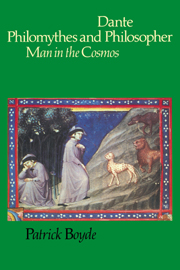1 - Wonder and knowledge
Published online by Cambridge University Press: 17 September 2009
Summary
The living dead
we do not usually think of theComedyas a ghost-story, but that is what it is. Out of a cast of hundreds, the protagonist Dante is the only creature of flesh and blood. All other human beings are referred to as ‘souls’, ‘shades’ or ‘spirits’ (anime, ombre, spiriti). They are the living dead – ghosts.
The clear distinction between fact and fiction in our modern consciousness has led to a curious paradox. Relatively few educated people firmly believe in the existence of disembodied beings, and even fewer would publicly claim to have seen one: the philosophy of science has made sceptics of us all. But our scepticism does not prevent us from watching horror-films or from reading tales of mystery and imagination; and as a result, there must be very few people who could not say in advance what they would feel if they ever were confronted by a ghost. We have been conditioned to expect shock and fear in the first instance, manifested in such physical symptoms as a cold sweat, a pounding of the heart or a temporary seizure of the limbs. Subsequently, we should expect an onrush of other emotions that might range from amazement and astonishment through bewilderment, dread and suspense to wonder, marvel and awe, depending on the circumstances and on whether or not the ghost seemed well-intentioned.
- Type
- Chapter
- Information
- Dante Philomythes and PhilosopherMan in the Cosmos, pp. 43 - 56Publisher: Cambridge University PressPrint publication year: 1981
- 1
- Cited by



